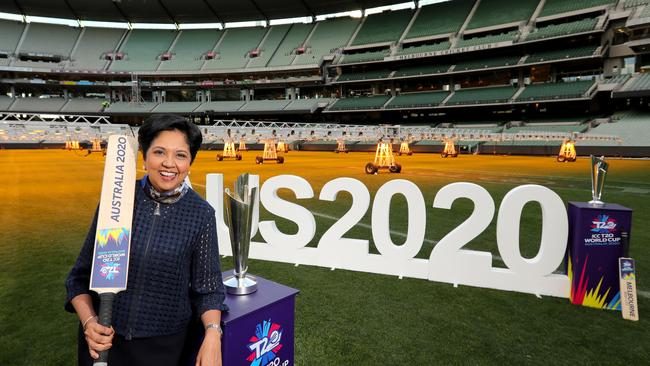Sport kicks corporate goals, says ex-Pepsi CEO Indra Nooyi
Indra Nooyi has a message for women aiming for top jobs in the corporate world: play more sport.

Indra Nooyi has a message for women aiming for top jobs in the corporate world: play more sport.
The one-time opening bowler for the first women’s cricket team from Madras Christian College at the University of Madras — “I’m five foot nine inches, so I could take the shine off the ball and bowl a good length,” Nooyi tells The Australian — made it to the top of the corporate world as the global PepsiCo chair and chief executive.
Since leaving Pepsi in October last year after more than a decade in charge, she has focused on board roles that include being the first independent director of the International Cricket Council and becoming a director of global giant Amazon in February.
It is the former role that particularly excites Nooyi in terms of helping empower women in the corporate world and to that end she has set the local organisers of the T20 World Cup in Australia in about 250 days time a big goal for the women’s final: beat the 93,013 that went to the Melbourne Cricket Ground for the Australian men’s team’s win against New Zealand by at least one attendee, and set a world record for a women’s sporting event in the process.
But Nooyi also wants the T20 World Cup — the women’s tournament will be held next February and March and the men’s later in the year in October and November 2020 — and sport in general to have a greater purpose.
“The time has come to use sport more as a galvanising vehicle to move women along. We keep talking about gender parity and we wonder why the pipeline (for women to move into executive ranks) is broken. I think we should start by playing sport. Develop the capabilities and the confidence in yourself, generate your tailwinds and we know you will give yourself a solid base.
“We need to tap into the talents of women, and not to say to 50 per cent of the population you don’t count. So we need to build better pathways so women feel more comfortable playing sport.”
Symbolically, the women’s final of the tournament will be held on International Women’s Day, and Ms Nooyi wants the event to lead the way in increasing the visibility of women’s sport and also bring men and women together to discuss the role of women in society and the quest for gender parity.
Sport, she says, can help with the goal of parity in executive ranks. The theory is, Nooyi says, that by promoting elite level sport like T20 and the current women’s soccer world cup, more girls and young females will be empowered to play sport and go to be higher achievers.
“Girls who have played sport have greater social and economic mobility and are less likely to do drugs and perform better at school. Also, women who have played sport see projects through to their completion, motivate others and build strong teams, I read in a recent Ernst & Young report.”
Nooyi reels off statistics to prove her case. One study of 400 female executives in the “C-suite” across four continents shows 94 per cent played sport during their lives at some stage, and more than half had played sport at university level, compared to 39 per cent of women at other management levels.
About 74 per cent said having a background in sport would help accelerate a career, because you knew how to work in a team and how to move ahead. And two-thirds of the 2017 Fortune Most Powerful Women list played sport competitively at high school or college in the US.
But Ms Nooyi, in Australia for a two-night speaking engagement, still says there is a long way to go in terms of getting more females into corporate leadership roles, though she admitted last week’s milestone of 30 per cent of ASX200 board positions being filled by women was more positive than elsewhere in the world.
But she says more action is needed to allow women to be comfortable in deciding to work their way through corporate ranks or not.
“If they choose to stay home, that’s their decision. But if they want to come to work, we don’t want to take a confident woman and strip that confidence away because of what happens in the workforce. Once you take their confidence away, they become less competent.
“We have to address the issue of conscious and unconscious bias, the issue of the career clock and the biological clock being in conflict, how to enable them to have a family but provide support systems.”
And while she will not be drawn on the company’s overall strategy, even Amazon and its powerful online retail presence in the US is cited by Nooyi as being helpful for corporate females.
“I was with a group of women recently and they said ‘We cannot survive without Amazon’ ... in America. Women in particular who are balancing so many things, Amazon gives you the gift of time. It is important.
“Everyone looks at Amazon with a very positive lens.
“It is the No 1 brand in the world today.”




To join the conversation, please log in. Don't have an account? Register
Join the conversation, you are commenting as Logout